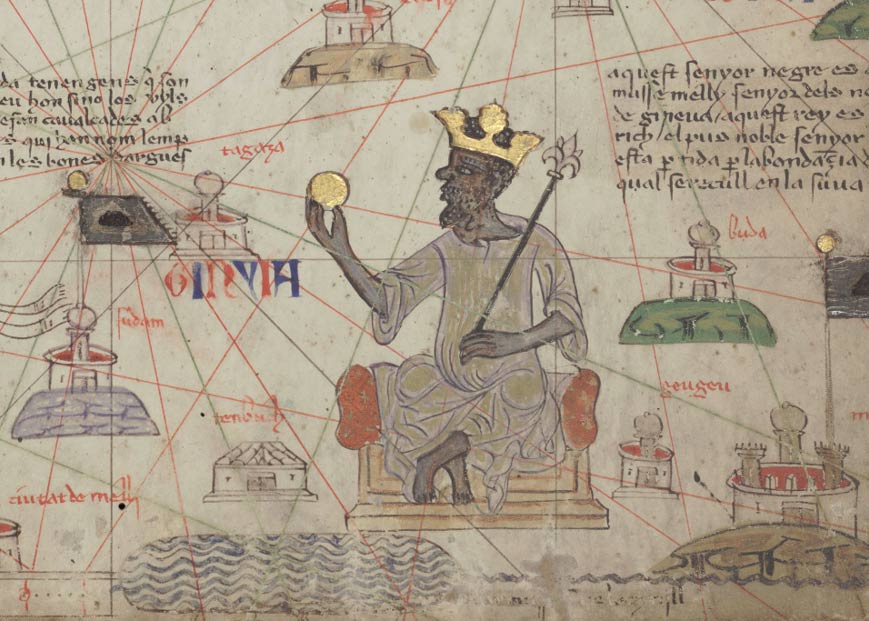The Legend of How Mansa Abu Bakr II of Mali Gave up the Throne to Explore the Atlantic Ocean
Mansa (meaning king, emperor or sultan) Abu Bakr II was a 14th century ruler of the Mali Empire in West Africa. This period of time, i.e. the 14th century, was a time when the Mali Empire had reached its pinnacle.
The wealth of the Mali Empire can be seen in the famous pilgrimage of Mansa Musa (Abu Bakr II’s immediate successor) to Mecca. According to Arab historians, this ruler spent so much gold during his pilgrimage that the “rate of the gold dinar fell by six [silver] dirhams”.
The empire’s peace and stability may have allowed a rather bizarre episode in Abu Bakr’s reign to take place. According to Syrian historian, al-Umari (who met Musa in Cairo) the Malian ruler’s predecessor had abdicated his throne so that he could explore the Atlantic Ocean.
The Story of Abu Bakr from His Successor
Very little is known about the life of Abu Bakr, and the only known written account about him at present may be found in the work of al-Umari. It may be interesting to note that this account of Abu Bakr comes from the mouth of his successor, Musa, and seems to be an explanation of how the latter came to power. One English translation of al-Umari’s conversation with Musa is as follows,
“So Abubakar equipped 200 ships filled with men and the same number equipped with gold, water, and provisions, enough to last them for years…they departed and a long time passed before anyone came back. Then one ship returned and we asked the captain what news they brought.
He said, 'Yes, Oh Sultan, we travelled for a long time until there appeared in the open sea a river with a powerful current…the other ships went on ahead, but when they reached that place, they did not return and no more was seen of them…As for me, I went about at once and did not enter the river.'
The Sultan got ready 2,000 ships, 1,000 for himself and the men whom he took with him, and 1,000 for water and provisions. He left me to deputies for him and embarked on the Atlantic Ocean with his men. That was the last we saw of him and all those who were with him.
And so, I became king in my own right.”

Artistic representation of the ‘Empire of Mansa Musa.’ (HistoryNmoor/CC BY SA 4.0)
Whilst the aim of this story was to explain the way in which Musa gained the throne of the Mali Empire, heralding the beginning of a new lineage of rulers, there seems to be much more focus in modern times on the actions of Abu Bakr.
- Sea-Farers from the Levant the first to set foot in the Americas: proto-Sinaitic inscriptions found along the coast of Uruguay
- Traditional African Medicine and its Role in Healing in a Modern World
- New research reveals back-to-Africa gene flow from Eurasia to southern African populations
- Prehistoric man in South Africa made milk-based paint tens of thousands of years ago
If the words of Musa and al-Umari are to be taken as reliable (this tale is not found in any other African or Arabic source, with the exception, perhaps, of oral tradition), then the Mansa’s abdication and subsequent voyage into the Atlantic Ocean may be considered as events that actually took place.

Abu Bakr riding in his ships. (Leo and Diane Dillon)
A Voyage to the New World?
Yet, there are those who are not content to stop where al-Umari’s narrative ends, and have extrapolated the tale. Instead of merely sailing ‘on’ the Atlantic Ocean, Abu Bakr is speculated to have sailed ‘across’ this body of water, and even reached the Americas. Evidence that seem to support such claims have even been presented.
Place names on old maps, for example, are said to show that Abu Bakr and his men had landed in the New World. The Malians are claimed to have named certain places after themselves, such as Mandinga Port, Mandinga Bay and Sierre de Mali. The exact locations of such sites, however, are unclear, as one source states that these places are in Haiti, whilst another puts them in the region of Mexico.

Muslims (some say including Mansa Abu Bakar II) meet with Native Americans. (Historie Islamique)
Another common argument is that metal goods from West Africa were discovered by Columbus when he arrived in the Americas. One source claims that Columbus himself reported that he had obtained metal goods of West African origin from the Native Americans. Another source asserts that chemical analyses of gold tips found by Columbus on spears in the Americas showed that the gold probably came from West Africa.
Many other examples of the purported Malian presence in the New World have also been given, including skeletons, inscriptions, a building that looked like a mosque, linguistic analyses, and carvings said to depict Malians. Such evidence, however, is not entirely convincing, as the sources that list them do not provide additional information or references to further support their claims. For example, rather than merely stating that places named by the Malians were found on old maps, it may be more persuasive if credible examples to these ‘old maps’ were given.

The Great Mosque of Djenne, Mali. (CC BY-SA 3.0)
Given that the present evidence for Abu Bakr’s voyage to the Americas is unconvincing at best, and non-existent at worst, it seems unlikely that the Malian ruler had reached the New World during his expedition into the Atlantic Ocean. Nevertheless, the tale of Abu Bakr’s abdication and exploration of the Atlantic Ocean (once again, if Musa and al-Umar are to be believed) is a fantastic one, tantamount, perhaps, to a modern world leader quitting his / her job to become an astronaut.
Featured image: Musa depicted holding a gold coin from the 1375 Catalan Atlas. Photo source: Public domain
By Ḏḥwty
References
Baxter, J., 2000. Africa's 'greatest explorer'. [Online]
Available at: http://news.bbc.co.uk/2/hi/africa/1068950.stm
Born Black International, 2009. The Battle for the Americas. [Online]
Available at: http://www.bornblackmag.com/discovery.html
Bukhari, Z. H., 2004. Muslims' Place in the American Public Square: Hope, Fears, and Aspirations. Walnut Creek, Ca.: AltaMira Press.
Firas, 2012. Columbus was (not) the First to Cross the Atlantic. [Online]
Available at: http://lostislamichistory.com/columbus-was-not-the-first-to-cross-the-atlantic/
Reklaw Education Ltd, 2014. 50 Greatest Africans - Mansa Abubakari II & Sultan Abu l-Hasan. [Online]
Available at: http://www.whenweruled.com/articles.php?lng=en&pg=5
The BBC, 2016. Mali. [Online]
Available at: http://www.bbc.co.uk/worldservice/africa/features/storyofafrica/4chapter3.shtml




















Comments
The Islamic culture has been of great influence to the western world right from the middle ages. The Moors, who were Muslim soldiers from North Africa occupied Spain and other great parts of Europe where they introduced their form of education and agriculture. The impact of Islamic culture to the Western world can not be underestimated.